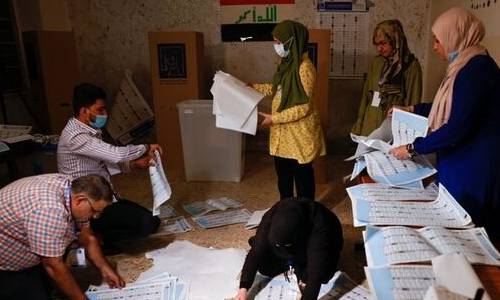Iraq's parliamentary election turnout lowest ever at 41%
Agencies | Baghdad
The Daily Tribune – www.newsofbahrain.com
Few Iraqis took to the polls on Sunday, as the country held its first parliamentary elections since a mass youth-led protest movement took the nation by storm in 2019.
The elections, which took place amid a widespread election boycott by anti-government activists, didn't generate much enthusiasm among Iraq's young population.
Only 41% of eligible voters cast their ballots, Iraq's electoral commission said Sunday night.
The lowest turnout, somewhere between 31% and 34%, was in Baghdad, Iraq's capital.
The full election results will be released within the next 24 hours.
Low participation reflects dwindling trust in political leaders
After polls closed at 6 p.m. local time (1500 GMT) — following some 11 hours of voting — Iraq's Prime Minister Mustafa Al-Kadhimi took to Twitter to celebrate the elections' alleged success.
"We have succeeded in fulfilling our promise and our duty in securing fair elections," Al-Kadhimi wrote.
The comments drew scrutiny from critics, who said the low turnout reflected voters' lack of confidence in the current government's willingness to hold fair elections.
Out of Iraq's 40 million population, some 24.9 million were eligible to vote.
Only 41% of them voted, marking a record-low turnout — falling slightly lower than the 2018 elections, which recorded a turnout of 44.5%.
A local elections monitor recorded violations like breaches of voting secrecy, and said a whopping 41% of voters it observed were not asked to show official documentation.
Journalists also eyed the elections with skepticism, after Baghdad's election authorities restricted media access only to several designated polling stations.
The vote will decide who gets to sit in the 329-seat legislature.
Under Iraq's laws, the winner of Sunday's vote gets to choose the country's next premier tasked with forming a government.
But negotiations for a premier are expected to drag on for longer.
The vote is being held under a new electoral law that aims to improve the chances of political independents winning seats.
Despite talk of reforms, many activists have called for a boycott after authorities carried out a bloody crackdown — as well as a string of targeted assassinations — that saw over 600 people killed and thousands more injured in the span of a few months.
While Iraq is in desperate need of change to tackle security and economic challenges, few of the nation's largely young population expect it to happen as a result of the elections.
A local elections monitor recorded violations like breaches of voting secrecy, and said a whopping 41% of voters it observed were not asked to show official documentation.
Journalists also eyed the elections with skepticism, after Baghdad's election authorities restricted media access only to several designated polling stations.
The vote will decide who gets to sit in the 329-seat legislature.
Under Iraq's laws, the winner of Sunday's vote gets to choose the country's next premier tasked with forming a government. But negotiations for a premier are expected to drag on for longer.
The vote is being held under a new electoral law that aims to improve the chances of political independents winning seats.
Despite talk of reforms, many activists have called for a boycott after authorities carried out a bloody crackdown — as well as a string of targeted assassinations — that saw over 600 people killed and thousands more injured in the span of a few months.
While Iraq is in desperate need of change to tackle security and economic challenges, few of the nation's largely young population expect it to happen as a result of the elections.
Related Posts

